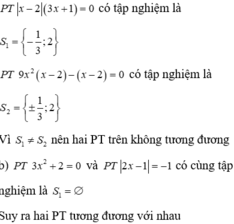

Hãy nhập câu hỏi của bạn vào đây, nếu là tài khoản VIP, bạn sẽ được ưu tiên trả lời.



Bài 9:
Không, vì $x+2=0$ có nghiệm duy nhất $x=-2$ còn $\frac{x}{x+2}=0$ ngay từ đầu đkxđ đã là $x\neq -2$ (cả 2 pt không có cùng tập nghiệm)
Bài 8:
a. Khi $m=2$ thì pt trở thành:
$(2^2-9)x-3=2$
$\Leftrightarrow -5x-3=2$
$\Leftrightarrow -5x=5$
$\Leftrightarrow x=-1$
b.
Khi $m=3$ thì pt trở thành:
$(3^2-9)x-3=3$
$\Leftrightarrow 0x-3=3$
$\Leftrightarrow 0=6$ (vô lý)
c. Khi $m=3$ thì pt trở thành:
$[(-3)^2-9]x-3=-3$
$\Leftrightarrow 0x-3=-3$ (luôn đúng với mọi $x\in\mathbb{R}$)
Vậy pt vô số nghiệm thực.

a) Ta có: \(x^2-2x-3=0\)
\(\Leftrightarrow x^2-3x+x-3=0\)
\(\Leftrightarrow x\left(x-3\right)+\left(x-3\right)=0\)
\(\Leftrightarrow\left(x-3\right)\left(x+1\right)=0\)
\(\Leftrightarrow\left[{}\begin{matrix}x-3=0\\x+1=0\end{matrix}\right.\Leftrightarrow\left[{}\begin{matrix}x=3\\x=-1\end{matrix}\right.\)
Vậy: \(S_1=\left\{3;-1\right\}\)(1)
Ta có: \(\left(x+1\right)\left(x+3\right)=0\)
\(\Leftrightarrow\left[{}\begin{matrix}x+1=0\\x+3=0\end{matrix}\right.\Leftrightarrow\left[{}\begin{matrix}x=-1\\x=-3\end{matrix}\right.\)
Vậy: \(S_2=\left\{-3;-1\right\}\)(2)
Từ (1) và (2) suy ra \(S_1\ne S_2\)
hay Hai phương trình \(x^2-2x-3=0\) và \(\left(x+1\right)\left(x+3\right)=0\) không tương đương với nhau

a) (x-1)(2x-1)=0
<=>2x^2 - 3x + 1 =0
Căn bằng hệ số ta có \(\hept{\begin{cases}m=2\\-\left(m+1\right)=-3\\1=1\end{cases}}\)<=>m=2